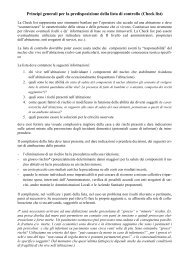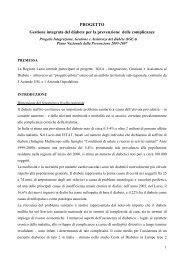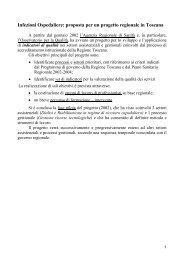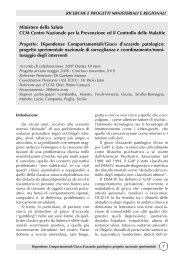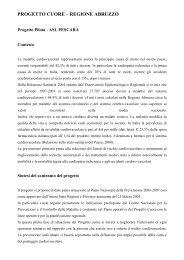Gaining health : analysis of policy development in European ...
Gaining health : analysis of policy development in European ...
Gaining health : analysis of policy development in European ...
You also want an ePaper? Increase the reach of your titles
YUMPU automatically turns print PDFs into web optimized ePapers that Google loves.
Capacity mapp<strong>in</strong>g<br />
The <strong>policy</strong> formulation process requires not only an <strong>analysis</strong><br />
<strong>of</strong> the <strong>health</strong> status <strong>of</strong> the population but also <strong>of</strong> capacities<br />
for <strong>policy</strong> implementation and the potential for cooperation<br />
and synergy, <strong>in</strong>clud<strong>in</strong>g potential relationships with other<br />
exist<strong>in</strong>g policies. Little assessment <strong>of</strong> feasibility, capacities or<br />
assets is evident among the sample countries: even <strong>in</strong> those<br />
countries with the richest knowledge base for <strong>policy</strong> formulation,<br />
capacity mapp<strong>in</strong>g is one <strong>of</strong> the weakest areas.<br />
This is <strong>in</strong> accordance with the f<strong>in</strong>d<strong>in</strong>gs <strong>of</strong> a WHO project to<br />
map capacities <strong>in</strong> <strong>European</strong> countries (7), which concluded<br />
that “the connections between policies <strong>in</strong> other sectors and<br />
their impacts on <strong>health</strong> are not well understood and implemented.<br />
Possible assets for <strong>policy</strong> implementation outside<br />
the <strong>health</strong> sector are rarely referred to, which is perhaps<br />
to be expected given the relatively recent <strong>in</strong>clusion <strong>of</strong> the<br />
social determ<strong>in</strong>ants <strong>of</strong> <strong>health</strong> <strong>in</strong> the <strong>policy</strong> formulation process.<br />
However, this does seem to be slowly chang<strong>in</strong>g with<br />
the <strong>in</strong>fluence <strong>of</strong> EU membership and other <strong>in</strong>ternational<br />
support programmes”. A po<strong>in</strong>t worth not<strong>in</strong>g <strong>in</strong> this respect<br />
is that countries request<strong>in</strong>g support from <strong>in</strong>ternational fund<strong>in</strong>g<br />
agencies for <strong>policy</strong> implementation are usually required<br />
to <strong>in</strong>dicate available resources.<br />
Utiliz<strong>in</strong>g “s<strong>of</strong>ter” <strong>in</strong>formation<br />
There was little evidence <strong>of</strong> the use <strong>of</strong> <strong>in</strong>formation on the<br />
feasibility and acceptability <strong>of</strong> tak<strong>in</strong>g action, <strong>in</strong>clud<strong>in</strong>g the<br />
position and op<strong>in</strong>ions <strong>of</strong> stakeholders and potential partners,<br />
<strong>in</strong> most <strong>of</strong> the countries studied. Ireland is notable,<br />
however, for hav<strong>in</strong>g made considerable efforts to elicit the<br />
views <strong>of</strong> stakeholders. In Hungary, the role <strong>of</strong> such “s<strong>of</strong>ter”<br />
knowledge <strong>in</strong> the <strong>policy</strong>-mak<strong>in</strong>g process, and the need to<br />
balance “s<strong>of</strong>t” knowledge and “hard” epidemiological data,<br />
has been explicitly discussed <strong>in</strong> recent years.<br />
Information technology and organiz<strong>in</strong>g the database<br />
The case studies <strong>of</strong>fer numerable examples <strong>of</strong> new <strong>in</strong>formation<br />
technologies and communication tools be<strong>in</strong>g developed<br />
and utilized for <strong>policy</strong> <strong>development</strong>. This is further encouraged<br />
by the availability <strong>of</strong> considerable EU fund<strong>in</strong>g for such<br />
projects. Naturally, there is a huge potential for strengthen<strong>in</strong>g<br />
the <strong>in</strong>formation base for <strong>policy</strong> <strong>development</strong> through<br />
the creation <strong>of</strong> <strong>in</strong>tegrated databases and <strong>of</strong> clear<strong>in</strong>g houses<br />
<strong>of</strong>fer<strong>in</strong>g examples <strong>of</strong> policies, guidel<strong>in</strong>es and best practice.<br />
One major restriction, however, is the frequent lack <strong>of</strong> longterm<br />
fund<strong>in</strong>g for the <strong>in</strong>stitutionalization <strong>of</strong> such databases.<br />
The WHO Regional Office for Europe organized a technical<br />
meet<strong>in</strong>g on the use <strong>of</strong> national databases <strong>in</strong> decision-mak<strong>in</strong>g<br />
(8), which concluded that most countries have some problems<br />
with date sources and that they should:<br />
• try to ensure a legislative basis for data exchange; and<br />
• make greater efforts to have a comprehensive database<br />
with a variety <strong>of</strong> data normally used by decision-makers.<br />
Some <strong>of</strong> the reasons for not us<strong>in</strong>g evidence-based <strong>in</strong>formation<br />
are relevant for NCD <strong>policy</strong>-mak<strong>in</strong>g and were reflected<br />
<strong>in</strong> some <strong>of</strong> the case studies:<br />
• frequent changes and lack <strong>of</strong> cont<strong>in</strong>uity <strong>of</strong> staff at<br />
m<strong>in</strong>istries <strong>of</strong> <strong>health</strong>, lack <strong>of</strong> collaboration between data<br />
producers result<strong>in</strong>g <strong>in</strong> duplication and errors, and lack <strong>of</strong><br />
collaboration across m<strong>in</strong>istries;<br />
• <strong>in</strong>appropriate presentation, as expressed by the wrong<br />
level <strong>of</strong> disaggregation (too detailed), un<strong>in</strong>formative<br />
statistical tables, or a lack <strong>of</strong> the time, resources or motivation<br />
to issue <strong>in</strong>formation <strong>in</strong> a digestible format;<br />
• data not available when needed;<br />
• users not tra<strong>in</strong>ed to f<strong>in</strong>d and use data or data not userfriendly;<br />
• failure to actively dissem<strong>in</strong>ate and advertise available<br />
<strong>in</strong>formation;<br />
• no agreement on priorities or how to prioritize; and<br />
• communication difficulties between producers and<br />
users.<br />
Chapter 5<br />
225<br />
Reflections on experiences



